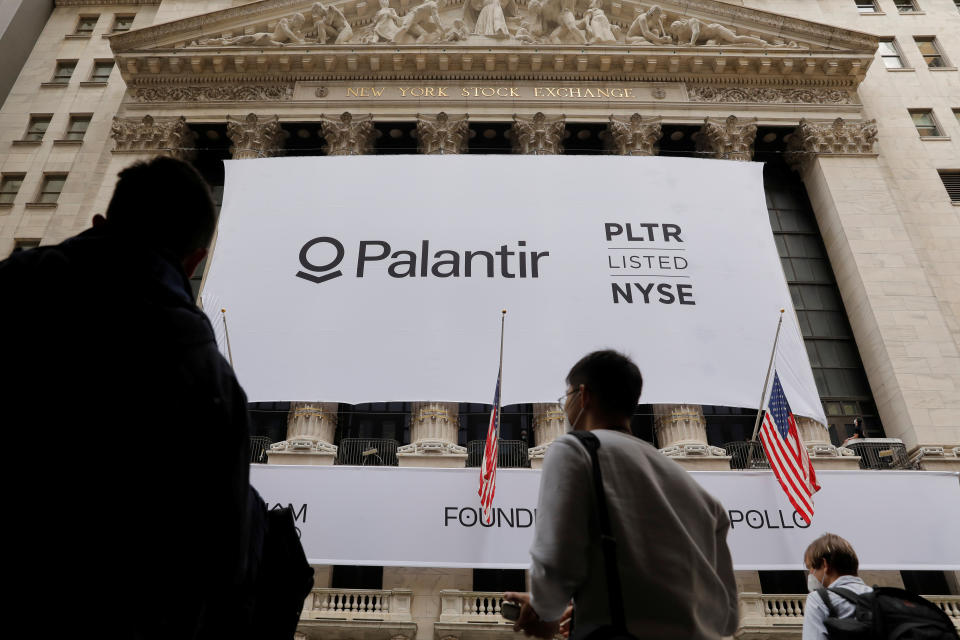Palantir earnings beat expectations, here's what the secretive data company does
Secretive big data firm Palantir (PLTR) issued its first earnings report after the bell on Thursday, beating analysts’ expectations on the top and bottom line for its fiscal third quarter.
These are the most important numbers from the announcement compared to what analysts were expecting, as compiled by Bloomberg.
Revenue: $289 million versus $279.3 million expected
Losses per share: $0.94
The firm reported revenue growth of 52% in the quarter and raised its fiscal year 2020 guidance. Shares were down 4.7% after the announcement.
Palantir provides big data analytics to the private and public sectors, giving organizations with a deeper understanding of everything from the location of improvised explosive devices in war zones to how automakers can improve manufacturing processes.
But Palantir has also seen its share of controversy. The sheer amount of information its software is capable of tracking — license plate numbers; Social Security numbers; social media accounts; addresses; bank records; interpersonal relationships — has led to comparisons with the thought crimes police in “Minority Report.”
In the quarter, the company said it “closed fifteen deals with new and existing customers, each worth $5 million or more in total contract value, including contracts with the U.S. Army and National Institutes of Health, as well as a contract renewal with one of the world’s largest aerospace companies worth $300 million in total contract value over five years.”
A heavy reliance on government contracts
Analysts and investors are trying to determine the kind of impact President-elect Joe Biden’s administration will have on defense spending going forward. Palantir, which works with the Defense Department, relies heavily on its government sector business, with Bloomberg saying it makes up half of the company’s sales. The other half is from Palantir’s private sector business.

The divisions are broken down by two different products that analyze data: Palantir Gotham and Palantir Foundry.
A customized option, Palantir Gotham is used by companies, government agencies, and law enforcement to comb huge swaths of information and uncover previously unseen patterns and identify relationships between sets of data ranging from social media posts and addresses to license plate numbers and personal relationships.
Foundry is a ready-made option focusing on clients ranging from pharmaceutical and automotive businesses to aviation companies like Airbus, and is meant to cut down on the costs associated with Gotham, such as the need for multiple on-site engineers.
The company is guided by billionaire co-founder and CEO Alex Karp. A graduate of Stanford Law School, like co-founder Peter Thiel, Karp has run Palantir since shortly after its inception. He’s also been vocal about his belief in the need for Silicon Valley companies to work with the U.S. government and law enforcement agencies.

Palantir says its software has assisted companies and government agencies in everything from the conviction of Ponzi schemer Bernie Madoff to disaster recovery to combating cyberattacks and fighting child exploitation. There’s even an apocryphal story that the firm’s technology was used to help locate Osama bin Laden.
The firm also claims its software helped the U.S. military track insurgents in Afghanistan planting improvised explosive devices (IEDs) by finding correlations between weather patterns, command wire IED attacks, and biometric information found on explosive devices. What’s more, the company says it provided its software to the Salt Lake City Police Department, helping officers reduce the amount of time it takes to perform complex investigations by 95%.
Palantir has used that kind of predictive policing model in New Orleans, according to The Verge. But predictive policing is controversial, and, according to studies, can lead to greater policing of minority and low-income communities.
The firm has also been targeted by demonstrators and its own employees for the work it does with ICE. After denying that it worked with ICE’s deportation arm, Karp told CNBC in January of 2020 that his firm's software was being used to "find people in our country who are undocumented."
In the past, according to Bloomberg, Palantir lost a number of partnerships with high-flying corporations including Hershey’s, Coca-Cola, Home Depot, and American Express due to the tech firm’s high costs. So far, though, the company is undaunted and continuing on Karp’s course.
A previous version of this post was published on Sept. 28, 2020.
Sign up for Yahoo Finance Tech newsletter
Got a tip? Email Daniel Howley at dhowley@yahoofinance.com over via encrypted mail at danielphowley@protonmail.com, and follow him on Twitter at @DanielHowley.
More from Dan:
Apple announces its first-ever M1 processor, coming to MacBooks and Macs
Sony PlayStation 5 review: Wild look, wilder controller, and big performance boost
Uber beats Q3 earnings expectations powered by growth in Eats business, Rides falls short
Follow Yahoo Finance on Twitter, Facebook, Instagram, Flipboard, SmartNews, LinkedIn, YouTube, and reddit.

 money
money 

